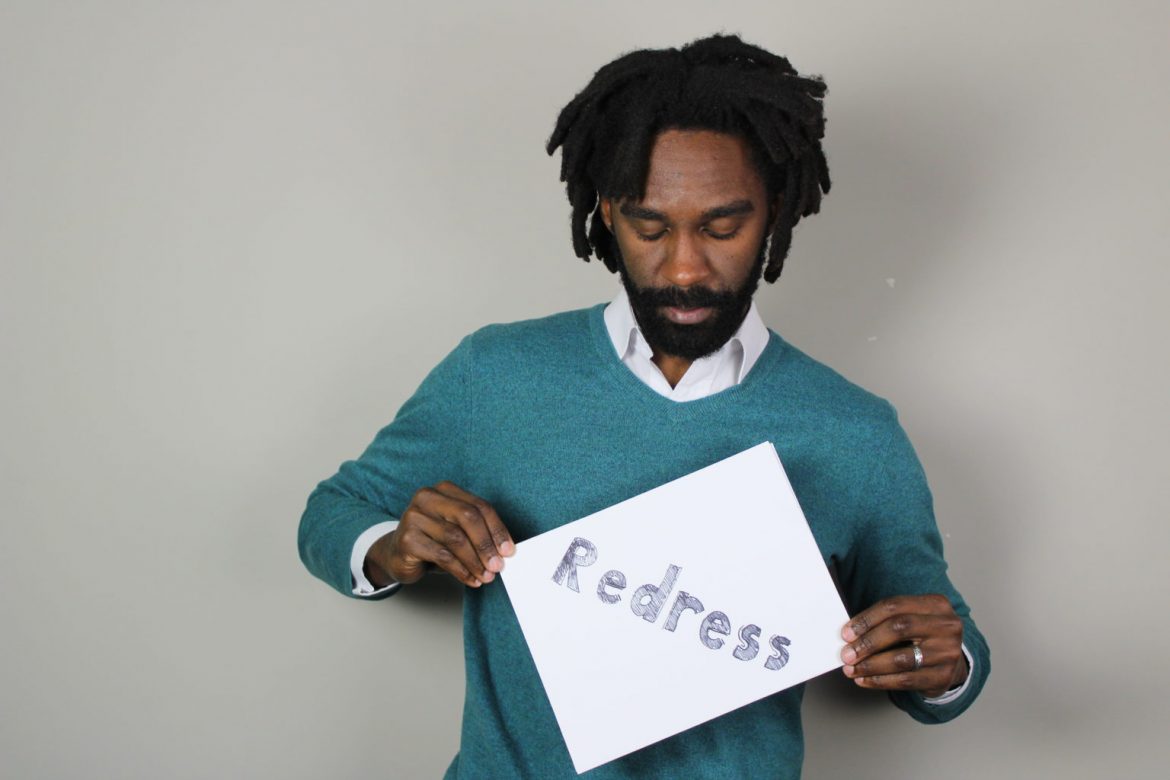Community organizer and activist Broderick Flanigan holds up a sign reading “Redress.” Flanigan believes the way the University of Georgia handled the discovery of human remains under Baldwin Hall was disrespectful to the black community. “As a black Athenian, it feels bad, it feels terrible (to see my community disrespected in this way),” Flanigan said. “Even in death, African Americans and certain people are still being displaced and disrupted. There’s still not peace, even in death, for some groups of people, or so it seems.” Photo by Kelly Fulford
UGA’s mishandling of the discovery of remains of enslaved peoples under Baldwin Hall shows the University’s disregard for the black community in Athens.
UGA constructed a memorial in front of Baldwin Hall on Nov. 16 in memory of the remains of 29 human bodies, most of whose DNA was of African descent, found under the building during reconstruction in 2015.
Though the intention of the memorial is a good one, the way the University has handled the remains is inconsiderate to the black community in Athens.
According to “Issues of Concern Related to the Baldwin Hall Expansion,” a paper written by several UGA anthropology department professors, UGA moved the bodies to the Oconee Hill Cemetery on March 7 without informing the black community.
This reflects a desire on UGA’s part to sweep the issue under the rug, rather than appropriately address the school’s complicated history with slavery.
“I feel like the University is responsible for testing the DNA of the people and trying to at least make a connection to the current, if there are any, living descendants,” community organizer and activist Broderick Flanigan said. “They kinda need to help discover that information. That’s part of their responsibility as a higher institution.”
It’s not a secret that UGA has greatly taken advantage of slave labor. According to UGA history professor Scott Nesbit, the campus did not own slaves, but instead “hired” them from slave owners to do maintenance around the campus. These enslaved people built campus buildings and were servants to the university professors and administrators.
But racism at UGA is not something that ended with abolition. Racism continues to thrive on UGA’s campus, mostly in subtle ways such as buildings named after segregationists and racists.
Mell Hall is named after Patrick Hues Mell, who wrote a paper titled “Slavery: Neither a Moral, Political, nor Social Evil.”
The Grady School of Journalism is named after Henry W. Grady, a white supremacist
who supported the New South.
The handling of the remains under Baldwin Hall is just a reflection of the institutional racism that still resides in UGA.
Considering that the majority of the remains were of African descent, it is only fair that the likely descendants of those enslaved peoples choose where and how to honor the remains.
Even though the University followed standard protocol given to them by state archeologist Brian
Tucker, it failed to give the community a voice in this decision.
“I can’t really speak to what UGA should or should not have done, because as a lead state agency, they are the decision makers on it. I will say that, in general, we encourage communication with community members and trying to make things be community-driven,” Tucker said.
The faculty of the UGA anthropology department, along with black community members, eventually addressed the inconsiderate handling of these enslaved people’s remains with the University during a press conference held at the Morton Theatre on March 4, 2017, but UGA should have handled it better from the start.
UGA’s inappropriate handling of the sensitive issue goes to show that UGA still doesn’t respect the black community as they should.
With a 70 percent white student body, buildings still named after slave-owners and a clear lack of consideration towards the black community in Athens, UGA is failing to distance itself from its history of white supremacy.
According to an Athens Banner-Herald article, with the exception of the Morton Theatre, Baldwin Hall will be the only other historical landmark representing the black community in Athens.
This memorial was UGA’s chance to do right by the community of people it has neglected for ages.
UGA needs to stop commemorating its racist past and start acknowledging and respecting the unknown African-Americans who have contributed to the UGA campus.
